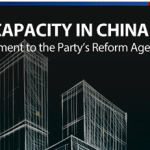European Chamber Launches New Study on Curbing Industrial Overcapacity in China Go back »
2009-11-26 | All chapters

Beijing, 26th November 2009 -- The European Union Chamber of Commerce in China today launched a unique new study examining the impact and influence of industrial overcapacity in China. Entitled Overcapacity in China: Causes, Impacts and Recommendations, the study is the first ever industry-led report on industrial capacity utilization in China and is published in partnership with Roland Berger Strategy Consultants. The sixty-page study offers a detailed analysis of the causes and effects of overcapacity across six key Chinese industries. The study has found that the recent measures taken by the Chinese authorities to curb overcapacity are a positive first step. However, the European business community in China sees further possibilities for improvement and drawing on the knowledge and experience of the European Chamber’s 1,400 member companies, provides a series of recommendations on how this problem can be curbed.
Said European Chamber President Joerg Wuttke, “Our study shows that the impact of overcapacity is subtle but far reaching, affecting dozens of industries and damaging economic growth not only in China but worldwide. Domestically, excess capacity squeezes profit margins, hampers innovation and prevents the emergence of true local champions, while on the global stage its influence is clearly seen in the rise in trade tensions between China and its major trading partners. This study, then, aims to offer solutions that will benefit not only Chinese companies and Chinese industry in general, but the whole global economic system. When China prospers, we all benefit.”
The study concludes that overcapacity is a major factor holding back China’s sustainable economic development and traces its impact as a driving force in economic resource waste, a rise in non-performing loans (NPLs) and environmental problems. The study further argues that excess capacity in certain sectors is holding back Chinese innovation by reducing company profits, meaning that less funding is made available for R&D. Moreover, as US and European savings rates rise and imports drop, the study findings show that overcapacity is one of the drivers of the current rise in trade tensions and anti-dumping cases between China and its trade partners.
Based on these findings, Overcapacity in China: Causes, Impacts and Recommendations concludes by offering a number of suggestions on how overcapacity can be curbed by shifting policy emphases and continuing to move away from an investment- and export-led growth model. The study’s recommendations include:
1. Stimulating domestic consumption and ensuring that new investment is focused on “smart” investments rather than more investments;
2. Promoting the development of a vibrant services sector - which is less resource- and energy-intensive - by encouraging competition;
3. Encouraging market-driven consolidation in sectors suffering from overcapacity;
4. Reforming pricing mechanisms to create a more balanced cost system for capital, energy and resource inputs
5. Strengthen the authorities of Central government agencies like Ministry of Environmental Protection to implement national law and crack down on local protectionism
Said Charles-Edouard Bouee, President of Asia, President & Managing Partner of Greater China, Roland Berger Strategy Consultants: “Industrial overcapacity has a strong impact on companies at every stage of the supply chain and on end users. As demand for China’s exports has plummeted in the US and Europe and fixed asset investment has risen sharply in some sectors, the problem of overcapacity has been amplified. For this reason, we believe that this study is a timely and valuable addition to the ongoing discussion about the future direction of China’s economic growth.”
This study has been widely reported by many media, including Associated Press, Bloomberg, Business Week, DPA, Financial Times (editorial), Financial Times, Global Times, Reuters and Wall Street Journal.
中国欧盟商会发布关于遏制中国工业产能过剩的研究报告
北京,2009年11月26日 -- 中国欧盟商会于今日发布了关于中国工业产能过剩问题的研究报告。这本名为《中国产能过剩研究—成因、影响和建议》的报告由中国欧盟商会与罗兰•贝格国际管理咨询公司共同合作完成,是第一本关注中国工业产能利用率问题的行业性报告。这本60页的报告详细分析了中国六大核心产业目前所面临的产能过剩问题,研究了其成因和影响。研究表明,中国政府最近实施的遏制产能过剩的政策是积极的第一步。在华的欧盟商界认为中国在这方面应再接再厉,就此总结了中国欧盟商会1400多家会员企业的知识和经验,针对如何遏制这一问题,提供了数十条参考建议。
中国欧盟商会主席伍德克评论道:“我们的研究表明,产能过剩的影响是微妙而又深远的,影响着数十个行业,在中国乃至全世界范围内,破坏着经济的增长。在中国国内,过剩的产能降低利润率,阻碍创新,妨碍真正优秀的本土企业的涌现。而在国际上,产能过剩明显加剧了中国与其主要贸易伙伴间的贸易压力。这一研究的目的是提供解决方案,这不仅关乎广大中国企业及工业的发展,而且也有利于全球经济体系的完善。中国繁荣昌盛,我们所有人都获益匪浅。”
该研究报告总结指出产能过剩是抑制中国经济可持续发展的主要因素,阐述了产能过剩如何导致了经济资源的浪费、不良贷款的累积以及环境问题的加剧。研究进一步论证,某些行业内的过剩产能导致公司利润减少,用于研发的资金也随之缺乏,由此阻碍着中国的行业创新。研究同时表明,由于欧美各国的储蓄率上升、进口需求下降,产能过剩是中国目前与其贸易伙伴之间贸易压力加剧、反倾销案层出不穷的驱动因素之一。
在这些研究结果的基础上,针对如何通过转变政策重点,如何继续降低经济增长对投资和出口的依赖,《中国产能过剩研究—成因、影响和建议》总结出了数十条参考建议,其中包括:
1. 刺激国内消费增长,确保新增投资更关注于“智慧型”投资,而不只是投资额的积累。
2. 通过鼓励行业竞争,促进服务行业的活跃发展(这一行业对原料和能源的需求较少)
3. 在受产能过剩困扰的行业内,鼓励建立统一的市场机制驱动体系
4. 深化价格体制改革,创建一个更为平衡的资本、能源及原料成本体系
5. 加强中央行政机构(如环境保护部)对国家级法律法规的执行力度以及对地方保护主义的遏制力
罗兰•贝格国际管理咨询公司亚洲区总裁、大中华区总裁及执行合伙人常博逸先生表示:“产能过剩对供应链上每一个环节的企业以及终端用户都有着深远的影响。随着美国与欧洲对中国出口需求的骤降以及固定资产投资的激增,产能过剩问题在某些行业日趋严重。因此,我们相信这份研究报告将为中国未来经济发展提供及时而且有益的信息。”
For more information please contact
Xinhe Fan
- +86 (10) 64622066 ext.35
- xhfan@europeanchamber.com.cn


